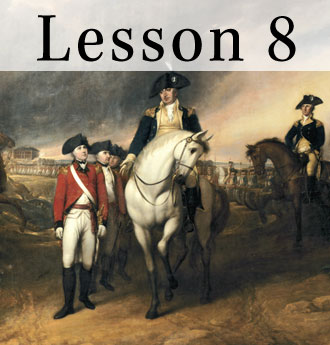Lesson 8: How was the Philadelphia Convention organized?
Henry, Patrick (1736-1799) A prominent political leader and supporter of the Revolutionary cause, Henry opposed the Philadelphia Convention and refused to attend. Henry argued against the development of a strong national government. He was suspicious of what might happen at the convention and is reported to have said "I smell a rat." Henry led opposition in Virginia to ratification of the Constitution and later worked to include the Bill of Rights in the Constitution.
Jefferson, Thomas (1743-1826) Thomas Jefferson was the third president of the United States. He was a scientist, philosopher, diplomat, and architect. He supported the revolutionary cause and served as governor of Virginia. Between June 11 and June 28, 1776, Jefferson wrote the initial draft of the Declaration of Independence, which was amended by John Adams and Benjamin Franklin and submitted to Congress. Jefferson supported the Constitution but was critical of its lack of a bill of rights. He was the first secretary of state in Washington's cabinet and the leader of the Republican Party. Jefferson was elected vice president in 1796 and was chosen president four years later. He was reelected to the presidency in 1804.
Madison, James (1751-1836) The "Father of the Constitution" was born to a wealthy Virginia family. He was taught at home and in private schools, then graduated from the College of New Jersey. While deciding whether to become a lawyer or minister, Madison became involved in the revolutionary cause, thereby entering state and local politics. His poor health kept him from serving in the military. In 1780, Madison was chosen to serve in the Continental Congress, where he played a major role. He was one of the most influential voices calling for a constitutional convention. He came to the Philadelphia Convention with a plan for the new government, took extensive notes on the proceedings, spoke more than 150 times, and worked tirelessly on various committees. As one of the authors of The Federalist, Madison was also a key figure in the battle for ratification. Following the convention, Madison served as a member of the U.S. House of Representatives, helping to frame the Bill of Rights and organize the executive department. Under Jefferson, Madison served as secretary of state. He then succeeded Jefferson as president. In retirement, Madison continued to speak out on public issues.
Paine, Thomas (1737-1809) Author and political theorist. Born in England, he came to America in November, 1774. In early 1776, he published the pamphlet Common Sense which stirred many Americans to the revolutionary cause. During the war, his pamphlet, The Crisis, helped support the Revolution and encouraged the soldiers in the Continental Army.
Washington, George (1732-1799) George Washington was born in Virginia in 1732. He grew up there on several plantations along the Potomac and Rappahannock Rivers. He was not particularly well educated, but did learn surveying. In 1753, he began his service to the country, which was to continue throughout his life, despite his desire to live a more private existence. Washington's efforts as commander of the Continental Army are well known. After the Treaty of Paris was signed in 1783, Washington returned to his home, Mount Vernon. Although he did not initially want to attend the Philadelphia Convention, his friends convinced him that his presence was necessary. He was elected president of the convention but spoke little. His presence and approval, however, were important. Nearly everyone assumed that Washington would be the first president of the United States, which, of course, he was, serving from 1789-1797.




